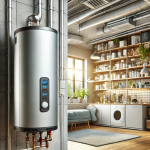Water Heater Tips For You
Maintaining a properly functioning water heater is essential for a comfortable and efficient home. Whether you’re using a traditional tank water heater or a modern tankless model, keeping it in good condition ensures consistent hot water and reduces energy bills. In this guide, we’ll provide detailed tips to help you maximize the performance, longevity, and efficiency of your water heater. From installation advice to troubleshooting common issues, these water heater tips will cover everything you need to know to keep your system running smoothly.
What Is a Water Heater?
A water heater is a household appliance responsible for heating water for various uses, such as bathing, cooking, cleaning, and heating. There are different types of water heaters available, including tank water heaters and tankless (on-demand) water heaters. Each system has its pros and cons, and understanding the type you have can help you maintain it more effectively.
Types of Water Heaters
1. Tank Water Heaters: These are the most common type of water heater and store a large volume of water that is heated and held at a constant temperature. Tank water heaters are available in electric, gas, and propane models.
2. Tankless Water Heaters: Also known as on-demand water heaters, these systems heat water as it flows through the unit, providing an endless supply of hot water. They are more energy-efficient than traditional tank models, as they only heat water when needed.
3. Solar Water Heaters: These systems use solar energy to heat water, making them highly energy-efficient. However, they require a backup heating source during cloudy days or in colder climates.
4. Heat Pump Water Heaters: These systems use electricity to move heat from one place to another, rather than generating heat directly, making them more energy-efficient than conventional electric water heaters.
How to Choose the Right Water Heater
Choosing the right water heater for your home depends on several factors, including the size of your household, the type of fuel available, and your budget. Selecting the correct system can result in long-term savings on energy bills and ensure your household has access to reliable hot water.
1. Size of the Household
The size of your household plays a crucial role in determining the right water heater. For larger households, a high-capacity tank water heater or a tankless water heater capable of providing continuous hot water might be necessary. For smaller homes, a lower-capacity tank or even a point-of-use water heater might be sufficient.
2. Energy Efficiency
When selecting a water heater, energy efficiency is a key consideration. Tankless water heaters and heat pump water heaters are generally more efficient than traditional tank models. Look for models with the ENERGY STAR rating, as they meet strict energy efficiency guidelines set by the U.S. Environmental Protection Agency.
3. Fuel Source
Your water heater’s fuel source will significantly affect its efficiency and operating costs. Gas water heaters typically cost less to operate than electric ones but may have higher upfront installation costs. Solar water heaters are highly efficient but require a backup system for cloudy days. Make sure to choose a system compatible with the fuel source in your home.
Water Heater Maintenance Tips
Regular maintenance is crucial for ensuring your water heater operates efficiently and lasts as long as possible. A well-maintained water heater can save you money on repairs and reduce energy consumption.
1. Flush the Tank Annually
For tank water heaters, sediment buildup at the bottom of the tank can reduce efficiency and lead to premature failure. Flushing the tank annually helps to remove this sediment and keeps the water heater running efficiently.
How to Flush Your Tank:
- Turn off the power or gas supply to the water heater.
- Attach a garden hose to the drain valve located at the bottom of the tank.
- Run the hose to a safe location where the water can drain.
- Open the drain valve and allow the tank to empty.
- Once the tank is empty, close the drain valve, remove the hose, and restore the power or gas supply.
2. Check the Anode Rod
The anode rod in a tank water heater helps prevent corrosion by attracting corrosive elements in the water. Over time, the rod will corrode and need to be replaced. Checking and replacing the anode rod every 3-5 years can extend the life of your water heater.
How to Inspect the Anode Rod:
- Turn off the water heater and drain a few gallons from the tank.
- Unscrew the anode rod located at the top of the tank.
- If the rod is less than 1/2 inch thick or is heavily corroded, it should be replaced.
3. Test the Pressure Relief Valve
The pressure relief valve ensures that your water heater doesn’t over-pressurize, which could result in dangerous malfunctions. Test the valve at least once a year to ensure it’s working correctly.
How to Test the Pressure Relief Valve:
- Place a bucket under the discharge pipe attached to the valve.
- Lift the valve’s lever to allow a small amount of water to flow out.
- If no water comes out, or if the valve is leaking, it will need to be replaced.
4. Inspect for Leaks
Regularly inspect your water heater for leaks around the tank, pipes, and valves. A small leak can indicate a larger problem, such as a corroded tank or a loose connection. If you notice any water pooling around the heater, address it immediately to prevent damage.
Troubleshooting Common Water Heater Issues
Even with regular maintenance, water heaters can sometimes experience issues. Knowing how to troubleshoot common problems can save you time and money on repairs.
1. No Hot Water
If your water heater isn’t producing hot water, the first step is to check the power source. For electric water heaters, check the circuit breaker. For gas water heaters, ensure that the pilot light is lit. If these aren’t the issue, the heating elements or thermostat may need to be replaced.
2. Inconsistent Water Temperature
Inconsistent water temperature is often caused by sediment buildup in the tank or a faulty thermostat. Flushing the tank and adjusting or replacing the thermostat can often resolve this issue.
3. Strange Noises
If your water heater is making strange noises like popping or banging, this is usually caused by sediment buildup in the tank. Flushing the tank can help resolve this issue. If the noise persists, the heating elements may need to be inspected.
4. Water Discoloration
Rust-colored water can indicate corrosion inside the tank or in the pipes. In many cases, replacing the anode rod or flushing the tank can resolve this issue. If the problem continues, it may be time to replace the water heater.
How to Extend the Life of Your Water Heater
Water heaters can be a significant investment, so it’s important to extend their life as long as possible. Here are some ways to ensure your system lasts for many years.
1. Install a Water Softener
Hard water can cause mineral buildup inside your water heater, reducing efficiency and shortening its lifespan. Installing a water softener can help prevent this problem by reducing the amount of minerals in the water.
2. Lower the Temperature Setting
Most water heaters are set at 140°F by default, but lowering the temperature to 120°F can reduce energy consumption and prevent scalding. Additionally, a lower temperature setting reduces the risk of overheating and wear on the system.
3. Insulate the Tank
Adding an insulating blanket to your tank water heater can improve its efficiency by reducing heat loss. This is especially useful for older water heaters that don’t have built-in insulation.
4. Schedule Regular Professional Maintenance
While there are many tasks you can perform yourself, scheduling an annual professional maintenance visit can ensure your water heater is running efficiently and catch any potential issues before they become serious problems.
Conclusion
Proper maintenance and care can significantly improve the efficiency and longevity of your water heater. Whether you have a traditional tank model or a tankless system, following these water heater tips will ensure you enjoy consistent hot water and energy savings for years to come. If you experience any issues or need professional help, don’t hesitate to contact a certified technician for assistance.
By taking the time to maintain your water heater properly, you’ll not only save on energy costs but also avoid the inconvenience of unexpected breakdowns. Implement these tips today to keep your water heater in top condition.

